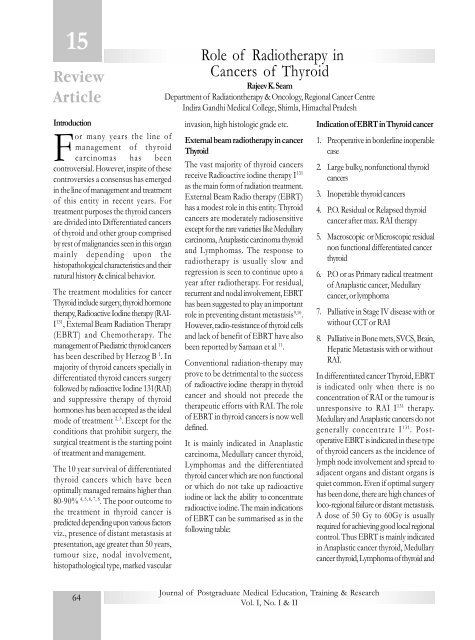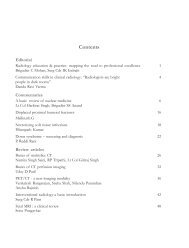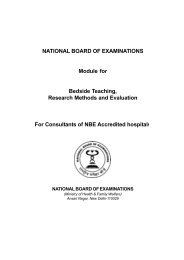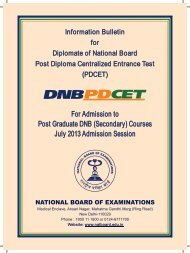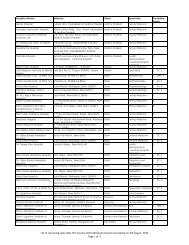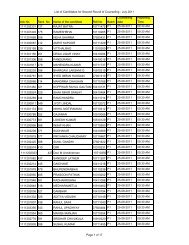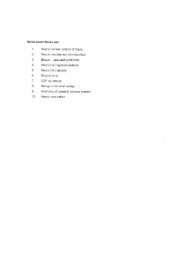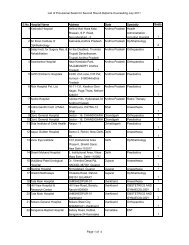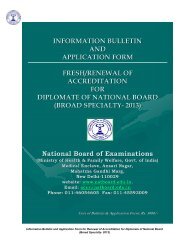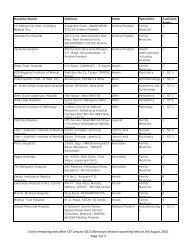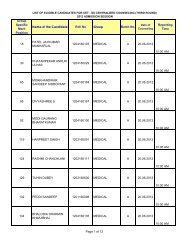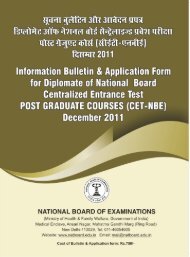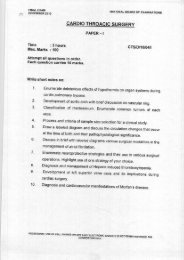Journal 1pages FINAL 34- - National Board Of Examination
Journal 1pages FINAL 34- - National Board Of Examination
Journal 1pages FINAL 34- - National Board Of Examination
Create successful ePaper yourself
Turn your PDF publications into a flip-book with our unique Google optimized e-Paper software.
15ReviewArticleIntroductionFor many years the line ofmanagement of thyroidcarcinomas has beencontroversial. However, inspite of thesecontroversies a consensus has emergedin the line of management and treatmentof this entity in recent years. Fortreatment purposes the thyroid cancersare divided into Differentiated cancersof thyroid and other group comprisedby rest of malignancies seen in this organmainly depending upon thehistopathological characteristics and theirnatural history & clinical behavior.The treatment modalities for cancerThyroid include surgery, thyroid hormonetherapy, Radioactive Iodine therapy (RAI-I 131 , External Beam Radiation Therapy(EBRT) and Chemotherapy. Themanagement of Paediatric thyroid cancershas been described by Herzog B 1 . Inmajority of thyroid cancers specially indifferentiated thyroid cancers surgeryfollowed by radioactive Iodine 131(RAI)and suppressive therapy of thyroidhormones has been accepted as the idealmode of treatment 2, 3 . Except for theconditions that prohibit surgery, thesurgical treatment is the starting pointof treatment and management.The 10 year survival of differentiatedthyroid cancers which have beenoptimally managed remains higher than80-90% 4, 5, 6, 7, 8 . The poor outcome tothe treatment in thyroid cancer ispredicted depending upon various factorsviz., presence of distant metastasis atpresentation, age greater than 50 years,tumour size, nodal involvement,histopathological type, marked vascularRole of Radiotherapy inCancers of ThyroidRajeev K. SeamDepartment of Radiationtherapy & Oncology, Regional Cancer CentreIndira Gandhi Medical College, Shimla, Himachal Pradeshinvasion, high histologic grade etc.External beam radiotherapy in cancerThyroidThe vast majority of thyroid cancersreceive Radioactive iodine therapy I 131as the main form of radiation treatment.External Beam Radio therapy (EBRT)has a modest role in this entity. Thyroidcancers are moderately radiosensitiveexcept for the rare varieties like Medullarycarcinoma, Anaplastic carcinoma thyroidand Lymphomas. The response toradiotherapy is usually slow andregression is seen to continue upto ayear after radiotherapy. For residual,recurrent and nodal involvement, EBRThas been suggested to play an importantrole in preventing distant metastasis 9,10 .However, radio-resistance of thyroid cellsand lack of benefit of EBRT have alsobeen reported by Samaan et al 11 .Conventional radiation-therapy mayprove to be detrimental to the successof radioactive iodine therapy in thyroidcancer and should not precede thetherapeutic efforts with RAI. The roleof EBRT in thyroid cancers is now welldefined.It is mainly indicated in Anaplasticcarcinoma, Medullary cancer thyroid,Lymphomas and the differentiatedthyroid cancer which are non functionalor which do not take up radioactiveiodine or lack the ability to concentrateradioactive iodine. The main indicationsof EBRT can be summarised as in thefollowing table:Indication of EBRT in Thyroid cancer1. Preoperative in borderline inoperablecase2. Large bulky, nonfunctional thyroidcancers3. Inoperable thyroid cancers4. P.O. Residual or Relapsed thyroidcancer after max. RAI therapy5. Macroscopic or Microscopic residualnon functional differentiated cancerthyroid6. P.O or as Primary radical treatmentof Anaplastic cancer, Medullarycancer, or lymphoma7. Palliative in Stage IV disease with orwithout CCT or RAI8. Palliative in Bone mets, SVCS, Brain,Hepatic Metastasis with or withoutRAI.In differentiated cancer Thyroid, EBRTis indicated only when there is noconcentration of RAI or the tumour isunresponsive to RAI I 131 therapy.Medullary and Anaplastic cancers do notgenerally concentrate I 131 . PostoperativeEBRT is indicated in these typeof thyroid cancers as the incidence oflymph node involvement and spread toadjacent organs and distant organs isquiet common. Even if optimal surgeryhas been done, there are high chances ofloco-regional failure or distant metastasis.A dose of 50 Gy to 60Gy is usuallyrequired for achieving good local regionalcontrol. Thus EBRT is mainly indicatedin Anaplastic cancer thyroid, Medullarycancer thyroid, Lymphoma of thyroid and64<strong>Journal</strong> of Postgraduate Medical Education, Training & ResearchVol. I, No. I & II


